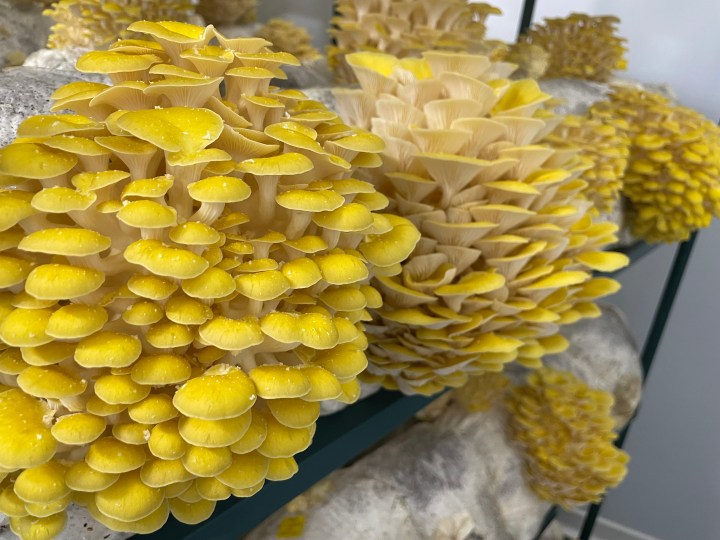
Inside Smallhold’s specialty mushroom supply chain

In the lobby of a warehouse in Vernon, California, south of downtown Los Angeles, a sign reads: “We change minds with mushrooms.”
“Once you start getting into mushrooms, then you start to become obsessed with the whole thing,” said Andrew Carter, co-founder and CEO of Smallhold, a company hoping to connect more Americans to the fruiting bodies of fungi.
According to the Department of Agriculture, people in the United States consume roughly 3 pounds of fresh mushrooms annually. However, they’re becoming increasingly popular as a meat replacement and an ingredient in biodegradable packaging, coffee alternatives, skin creams and more.
“People are incorporating mushrooms in almost every industry now, and we want to be the leader in high-quality, sustainably produced mushrooms,” Carter said. “We have these farms strategically located around the United States to access as many people as possible.”

In the United States, the mushroom industry is concentrated in Pennsylvania. According to the American Mushroom Institute, more than 60% of mushrooms produced in the U.S. are grown in and around Kennett Square, which touts itself as the mushroom capital of the world.
Smallhold, a Brooklyn, New York-based, venture capital-backed startup, hopes to buck that model with a distributed network of farms close to urban centers.
“We want to be as close as possible to our target consumers,” Carter said.
The company has facilities in Los Angeles County, Brooklyn and Austin, Texas. “But we’re trying to grow them everywhere,” Carter said.
Smallhold grows mushroom varieties that, until recently, were uncommon in American grocery stores. White button, cremini and portobello mushrooms (which are the same type of mushroom harvested at different ages) account for more than 95% of mushroom sales in the U.S.
But interest in specialty mushrooms, such as shiitake, lion’s mane and oyster mushrooms, is growing. Sales for commercially grown specialty mushrooms increased 32% in the 2021-2022 season from the year before.

Smallhold produces six varieties of mushrooms, including yellow oysters, blue oysters and lion’s mane.
“Not a lot of people are really familiar with these mushrooms, because they need to be fresh [and] they need to be grown in certain ways,” Carter said.
Carter gave “Marketplace” host Kai Ryssdal a tour of the Vernon facility, which has about three dozen temperature-controlled grow chambers.
“All of our mushrooms are grown on sawdust,” Carter said. “Most of the time, sawdust ends up in plywood, it goes to compost, sometimes it goes to landfill, but we’re diverting that.”

Carter has spent more than a decade in the indoor agriculture industry, mostly focused on leafy greens. He began experimenting with mushroom production around 2016.
“We spent the first few years of the business building out the technology and different applications of it,” he said. “It wasn’t really till COVID that you saw, like, really rapid growth.”
As more people cooked at home during the pandemic, interest in mushrooms grew. Smallhold pivoted from selling mushrooms to restaurants and grocery stores to home delivery of grow kits. Today, Smallhold’s products are available in retailers such as Whole Foods nationwide.

“They grow really rapidly,” Carter said, pointing to some young lion’s mane mushrooms. “These will be mature in the next two to three days.”
Click the audio player above to hear Ryssdal’s conversation with Carter at the Vernon, California, mushroom farm.
There’s a lot happening in the world. Through it all, Marketplace is here for you.
You rely on Marketplace to break down the world’s events and tell you how it affects you in a fact-based, approachable way. We rely on your financial support to keep making that possible.
Your donation today powers the independent journalism that you rely on. For just $5/month, you can help sustain Marketplace so we can keep reporting on the things that matter to you.

















